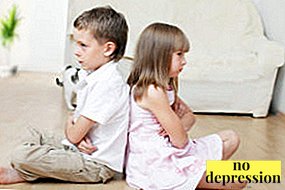Not only adults have a sense of jealousy, but also children.
Children's jealousy is born from awareness of the child of his personal "I", their desires and often manifested as a series of manipulations in relation to parents and other relatives.
The reasons

The child is jealous because afraid to lose the love and disposition of a dear person - mom, dad, grandmother, brother or sister and so on.
The causes of this fear are divided into external and internal.
Among the external causes of children's jealousy can be identified:
- parents' workload at work, reducing the amount of time mom or dad spent on the child;
- the birth of a second child;
- the beginning of the joint life of his parent with other people - the appearance of a stepmother or stepfather;
- the appearance in the family of a brighter representative who is a competitor - a child: friends or relative, stepbrother or sister;
- parental divorce or marital discord.
In this case, the child begins to think that his parents no longer love him and want to disperse precisely because of him.
Internal causes of child jealousy are:
- childish selfishness, self-centeredness - the child is not ready to share his attention and self-love with another person;
- lack of attention and love from parents or grandparents - the child, thus, reacts to an unfair attitude towards him, trying to attract attention, as if saying “I'm here, look at me”;
- lack of readiness for responsibility and natural maturity - the child does not understand why they stopped pampering him and began to demand something. Often this situation occurs when a child goes to school or has a younger brother or sister;
- inability to express one's feelings in any other way except jealousy;
 doubts in the fact that he is loved, heightened anxiety and fear of losing the location of mom or dad;
doubts in the fact that he is loved, heightened anxiety and fear of losing the location of mom or dad;- competing with a brother or sister, inspired rivalry for "a place in the sun";
- sense of helplessness, lostness - the child feels that he can in no way influence the changing reality.
How to help your child overcome jealousy of younger brothers and sisters? Find out from the video:
Classification
Depending on what caused the “fear of dislike”, jealousy is divided into the following types:
- Proprietary feeling - This is the most common type of jealousy, when a child does not wish to share the attention of his parent with another object: work, the second half, a newborn child and others.
At the same time, it is impossible to scold a child for aggression, otherwise jealousy will grow into real hatred.
- Low self-esteem - this type often occurs at an older age, when parents or other relatives begin to compare the behavior and talents of the child with another object in favor of the latter. “Look at how Kolya folds toys. Do you really not? ”, - such humiliations make the child more withdrawn and feel defective, wrong. It is very important for a child to be praised even for small achievements.
 Competitive principle - this feeling often arises in a family where there are two or more children. Of course, children can not be the same - for someone everything turns out easily and beautifully, and the other is given with difficulty.
Competitive principle - this feeling often arises in a family where there are two or more children. Of course, children can not be the same - for someone everything turns out easily and beautifully, and the other is given with difficulty.In this case, the more successful child gets more attention and praise from the parents, and the other child secretly begins to compete with his brother or sister so that his parents also praise and love.
Such a competitive feeling often persists throughout the adult life of children and extends to a more mature age.
Psychology of children's jealousy. How to solve the conflict between children? Useful tips:
How does it manifest itself?
The manifestation of children's jealousy depends largely on the cause of the feelings, temperament and character of the child. Therefore, childish jealousy can manifest itself in one or more of the following ways:
- aggression to the “third unnecessary” - this can be both a physical impact (fights, tweaks), and emotional pressure (resentment, humiliation);
- anxiety - in this case, the child accumulates negative emotions within himself, which can result in loss of appetite, insomnia or disturbed sleep patterns, loss of interest in games and entertainment, increased phobias and fears;
- sudden hyperactivity - the child feels his uselessness and decides to fill his life with something else. He becomes moody, active, restless, unable to focus his attention on one object, does not want to communicate with anyone and follow old habits;
 development of neurosis - accompanied by stuttering, speech disorders, behavioral changes, the appearance of hysterical reactions;
development of neurosis - accompanied by stuttering, speech disorders, behavioral changes, the appearance of hysterical reactions;- isolation in itself - there is no external manifestation of such jealousy, the child seems to be behaving as usual, but becomes more sad, squeezed, often crying or does not sleep well. Sometimes a child begins to fall ill, learn poorly, cannot concentrate his attention.
How to respond?
Many parents are not prepared for this behavior of their child. But do not be afraid or despair, children's jealousy is a completely natural reaction, because the child considers his mom or his dad the most important people in his life, and is very afraid of losing them.
When the first attacks of jealousy do not scream or punish the child - aggression and attacks from parents will only increase the child's jealousy, make him feel defective and unloved.
It is better to just calmly talk to him and try to figure out the reason for his reaction.
Get rid of jealousy completely fail, you can only drown her with care and love. It is also very important that the child feels safe and knows that parents will always love him. To do this, you need to spend more time with the child - to come up with some joint activities.
How to help the child?

To help your child cope with jealousy, you need to act as follows:
- Recognize feelings child and do not say that he is experiencing nothing and comes up with.
- Ask the child what can help him silence his alarm. If, due to the lack of everyday experience, he does not find the answer, try to push him in the right direction, think together.
- Agree on a personal and joint time. - agree on a time when the mom or dad will be fully owned by the child (even if it will be half an hour to read a book before bedtime).
- Do not harm yourself trying to please the baby, because if the parent is unhappy, then the child will be the same.
- Do not change old habits and lifestyle in connection with the appearance in the family of a new family member, so that the child feels in a familiar safe environment.
- Every child in the family should have your personal items and clothes.
You should not force the younger child to wear clothes for the older ones, otherwise he will feel unworthy of buying a new thing.
- Talk to the baby like with an adult discuss with him possible changes in his life, but at the same time do not ask for advice, but merely articulate his arguments.
- Do not impose the role of the child - with the advent of the stepfather, you should not ask to call the man "dad", and with the advent of a brother or sister, impose the role of "older." The child himself must be willing to accept a new family member.
- Give the child its own place, not even big enough for him to have a territory in which he feels completely safe.
Psychologist tips

Depending on who is jealous of the child, you should act differently.
How to avoid the jealousy of an older child to newborn? What to do when a second child appears in the family:
- prevent jealousy and initially instill in the child a love for his younger brother and sister. This is best done before the baby is born;
- to interest the child in bringing up A new family member, do not be afraid to give the baby in his arms, no matter how disturbing, explain how to handle the newborn;
- leave a child free from worries for brother or sister time;
- take at least half an hour to be alone with the child;
- do not blame the child for being the eldest and should understand everything - this not fair.
If something goes wrong with children, then it’s best to switch the child’s attention to something else.
- do not compare children with each other and, moreover, not to praise someone to the detriment of another.
What to do when you appear new man:
- initially, when meeting you, try to make the child and man friends;
- calmly explain to the child what is needed the appearance of a new man in the house;
- eliminate negative emotions and do not scold the child under a man and do not quarrel with a man with a child. They should only see each other’s positive emotions;
 don't try to re-educate child and not give a man to try to do this;
don't try to re-educate child and not give a man to try to do this;- do not fight with the father of the child, if possible to keep with him warm friendly relations (at least for the species).
What if baby jealous of mom to dad:
- do not reject child, but also to encourage his behavior - it is better to divert his attention to an interesting game, where father, mother and child will participate as equals;
- Triple hugsincluding a toddler and two parents;
- explain to the child that dad is the same family member like the kid himself;
- need to determine the timewhich mom will give only to dad, and make sure that the child does not take offense.
New dad. How to bring together a potential stepfather and your child? The answer to this question is given by a psychologist:
How to stop being jealous of a baby to grandmother?
Often, even my own mother begins to be jealous of a child to her grandmother (mother-in-law). Especially often this situation occurs when the child is in the care of the grandmother - Mom had to go to work, and for the kindergarten the baby is too small or there are simply no places in the institution.
The grandmother spends most of the time with the child, while the mother spends very little, so the woman begins to experience this zealous feeling.
What to do in this situation:
- To allocate maximum possible amount of time a child.
- Speak with the baby, asking what happened to him during her absence.
 To try maintain a good relationship with your grandmother, even if it's hard. The child should not see the negative in the relationship of important people.
To try maintain a good relationship with your grandmother, even if it's hard. The child should not see the negative in the relationship of important people.- Realize that the most important decisions in a child’s life will have to take exactly motherand not grandma.
- Admit to myself that grandma has more experience in raising children and the child is more comfortable in familiar conditions than with strangers in the same kindergarten.
- Talk to grandma, clarify the situation, come to a common decision.
Sibling rivalry - This is the baby’s natural feeling about the changes taking place in his life. You should not respond to jealousy of a child with shouts and attacks, but it is best to remember yourself in childhood and realize how difficult it is for a child now.
Mother-in-law makes children against mother. The sister-in-law is jealous of children to the mother-in-law. What to do? Find out from this video:

 doubts in the fact that he is loved, heightened anxiety and fear of losing the location of mom or dad;
doubts in the fact that he is loved, heightened anxiety and fear of losing the location of mom or dad; Competitive principle - this feeling often arises in a family where there are two or more children. Of course, children can not be the same - for someone everything turns out easily and beautifully, and the other is given with difficulty.
Competitive principle - this feeling often arises in a family where there are two or more children. Of course, children can not be the same - for someone everything turns out easily and beautifully, and the other is given with difficulty. development of neurosis - accompanied by stuttering, speech disorders, behavioral changes, the appearance of hysterical reactions;
development of neurosis - accompanied by stuttering, speech disorders, behavioral changes, the appearance of hysterical reactions; don't try to re-educate child and not give a man to try to do this;
don't try to re-educate child and not give a man to try to do this; To try maintain a good relationship with your grandmother, even if it's hard. The child should not see the negative in the relationship of important people.
To try maintain a good relationship with your grandmother, even if it's hard. The child should not see the negative in the relationship of important people.

